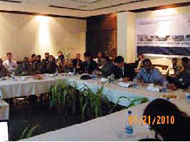Events
Workshop on Disaster Risks Management for Megacities
Date: January 21 - 22, 2010
Venue: School of Planning and Architecture, New Delhi, India
Organized by:
School of Planning and Architecture, New Delhi
Co-organized by:
- Kyoto University Global COE Program“Global Center for Education and Research on Human Security Engineering for Asian Megacities”
- Municipal Corporation of Greater Mumbai, India
Number of attendants: around 60 - 70
Report 094
Outline
The workshop on “Disaster Risks Management for Megacities” was organized by “School of Planning and Architecture”, New Delhi in collaboration with Kyoto University GCOE-HSE program and MCGM. This two days workshop was held in January, 2010. The workshop aimed to provide a platform for sharing ideas, knowledge and experience of professionals having different academic and working background including academicians, practitioners, local government officials and engineers as well as the students who are dealing with disaster risks uses of Indian megacities context, and a special thrust had been given to natural disaster risks of megacity Mumbai.
Report
The workshop was inaugurated by the Director of School of Planning and Architecture (SPA), New Delhi and the dean of studies, SPA, Prof. Kavas Kapadia introduce the workshop including purpose and scope of the workshop. Prof. Norio Okada as director of DPRI, Kyoto University also bought forward the issues and developed approaches for disaster risks reduction and prevention. In total, 12 presentation were presented in the workshop.
The first session of the workshop, three presenters of Municipal Corporation of Greater Mumbai had presented. Joint Municipal Commissioner (S. S. Shinde) MCGM gave a broad view of Mumbai disaster risks, and the major disaster prevention initiatives, like tetra communication system, ward control room, E-learning. V. Patil (Chief Engineer, MCGM) has shown an overview of the drainage system of Mumbai and shown its role in causing flooding in that city. Third presenter, N. V. Pai ( Assistant Municipal Commissioner, G/North Ward, MCGM) showed that what extent Dhravi, the biggest slum of Mumbai is prone to various disasters and in major cases these are man made disaster.
The Session 2 focused mailnly on the KU GCOE-HSE activities in Mumbai Project. H. Tatano, leader of GCOE Disaster Management field, (Professor, DPRI) showed the aims, objectives and scope of the project and he also introduced developed technologies and knowledge by DPRI to reduce flood risks in Japanese context which could be tested in India megacities as well. B. Misra, (Project coordinator, GCOE-HSE Mumbai base) focused on the possible counter measures of Mumbai disaster risks and available approaches to manage the such disaster. S.Samaddar (GCOE-HSE researcher) shared some of his field experience which showed trust and background risks are significant to implement integrated disaster risks management in Mumbai.
There were three presenters in Session-III. The first presenter, S. Kumar (Professor, NIDM) mentioned about physical, social and economic vulnerabilities of Indian cities by providing examples of recent disasters took place in Indian. M. K. Goel (Professor, IIT, Roorkee) focused on flood estimation on megacities by taking Mumbai as a case study. Rajini Mukherjee from UNDP had shared the progress of UNDP DRR program and showed how the results and experience may help to develop a management plan for disaster risks in Indian context.
In session-IV, using DFID livelihood model, community’s disaster resilience has been quantified by taking a slum of Mumbai as a case study by Prof. Janki (TISS, Mumbai). Mandeep Singhma (Profesoor, SPA) had shown that how better design, construction techniques, improve by-laws can help a great extent to reduce urban disaster risks. At last, a group of students of School of Planning and Architecture had presented their academic work. The study was an effort to identify the causes and consequences of major risks and disasters affecting Mumbai megacity and to assess the status and implications of initiatives taken by various agencies including MCGM. Finally, the study aims to formulate strategies at city and area level for disaster risks reduction.

